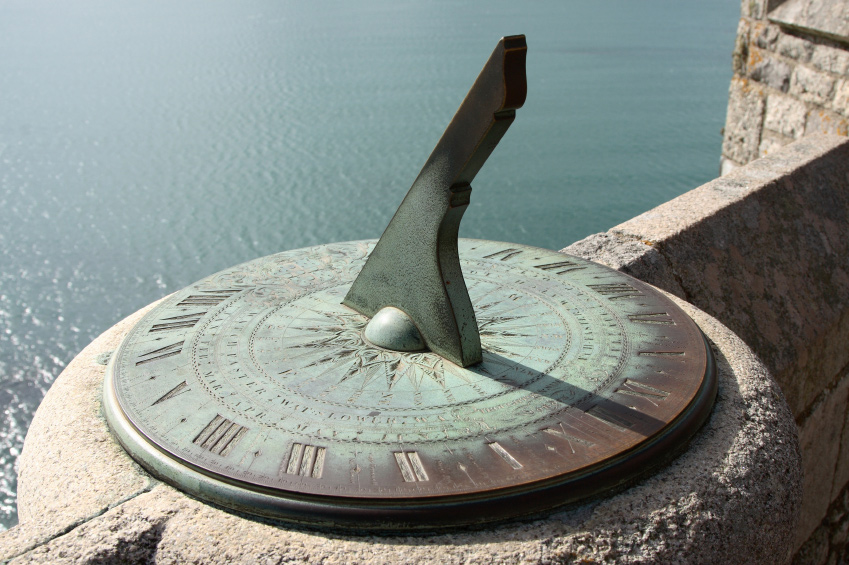The first step of the flowchart for the Shine and Rise bed involves starting the functions at a predetermined time.
This will involve the use of a clock.
How does the clock show it's time though?
Is it necessary to have a clock face? There other many ways of displaying the time.
A few examples are...
Sundial - shows the relative position between Sun and Earth and as the day progresses..

Analogue - the most common is the circular dial with hands moving radially. This contains the metaphor of time being cyclical, in the same way that the Sun appears to cycle around the Earth (from the viewpoint of the user). In the 'eone Bradley' this method of telling time has been made into a tactile experience for users who cannot see the hands.


Digital - in the age of computing the need for mechanical timepieces became redundant. A computerised watch with a digital display allowed for a timepiece with 'deep', many layered interfaces and multiple functions.

Binary Readouts - more of a novelty, a binary display shows the time by lights in an on or off state.
This one has 20 'bits' to show the time.

It is possible to reduce this to two linear arrays, one for the minutes and one for the hours, reducing the 'bits' to 6 and 4 respectively.

Hourglass - while not a way of telling the time of day, the hourglass shows a visual indication of time elapsed.

Seamless integration
Antoine de Saint-Exupery, in his 1939 book, 'Wind, Sand and Stars' tells us "A designer knows he has achieved perfection not when there is nothing left to add, but when there is nothing left to take away."
It would be elegant for the time-telling function to share some of the existing elements of the bed.
One way that comes to mind is to have the lights that wake you up in the morning also function as the display for showing what time the 'wake up call' is set for.
What about the way of inputting the alarm time. The pressure sensor in the bed could be used as a switch here. Jumping on the bed could set the wake up time. That would be fun.

This will involve the use of a clock.
How does the clock show it's time though?
Is it necessary to have a clock face? There other many ways of displaying the time.
A few examples are...
Sundial - shows the relative position between Sun and Earth and as the day progresses..

Analogue - the most common is the circular dial with hands moving radially. This contains the metaphor of time being cyclical, in the same way that the Sun appears to cycle around the Earth (from the viewpoint of the user). In the 'eone Bradley' this method of telling time has been made into a tactile experience for users who cannot see the hands.


Digital - in the age of computing the need for mechanical timepieces became redundant. A computerised watch with a digital display allowed for a timepiece with 'deep', many layered interfaces and multiple functions.

Binary Readouts - more of a novelty, a binary display shows the time by lights in an on or off state.
This one has 20 'bits' to show the time.

It is possible to reduce this to two linear arrays, one for the minutes and one for the hours, reducing the 'bits' to 6 and 4 respectively.

Hourglass - while not a way of telling the time of day, the hourglass shows a visual indication of time elapsed.

Seamless integration
Antoine de Saint-Exupery, in his 1939 book, 'Wind, Sand and Stars' tells us "A designer knows he has achieved perfection not when there is nothing left to add, but when there is nothing left to take away."
It would be elegant for the time-telling function to share some of the existing elements of the bed.
One way that comes to mind is to have the lights that wake you up in the morning also function as the display for showing what time the 'wake up call' is set for.
What about the way of inputting the alarm time. The pressure sensor in the bed could be used as a switch here. Jumping on the bed could set the wake up time. That would be fun.

Comments
Post a Comment